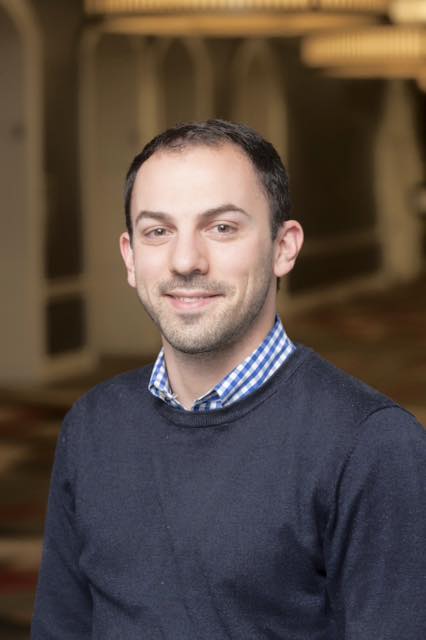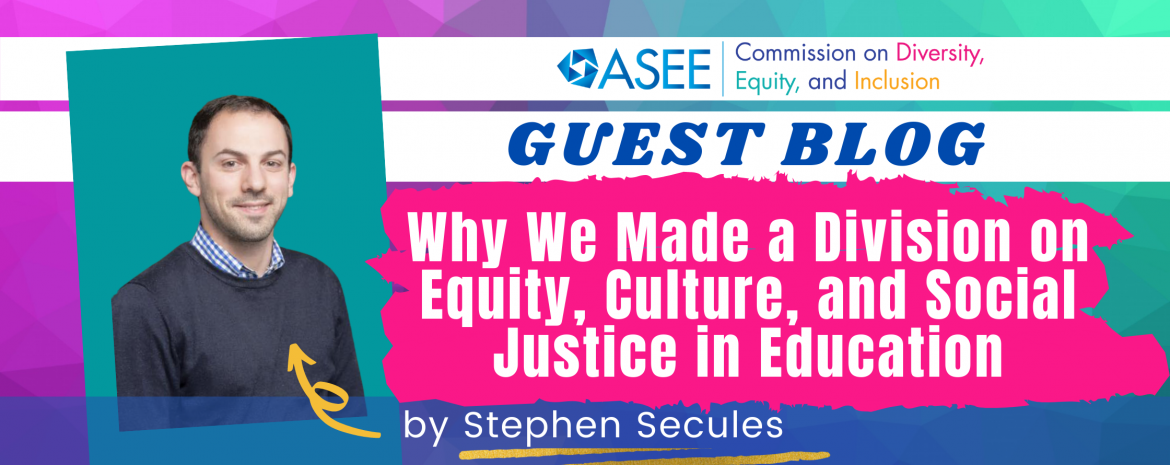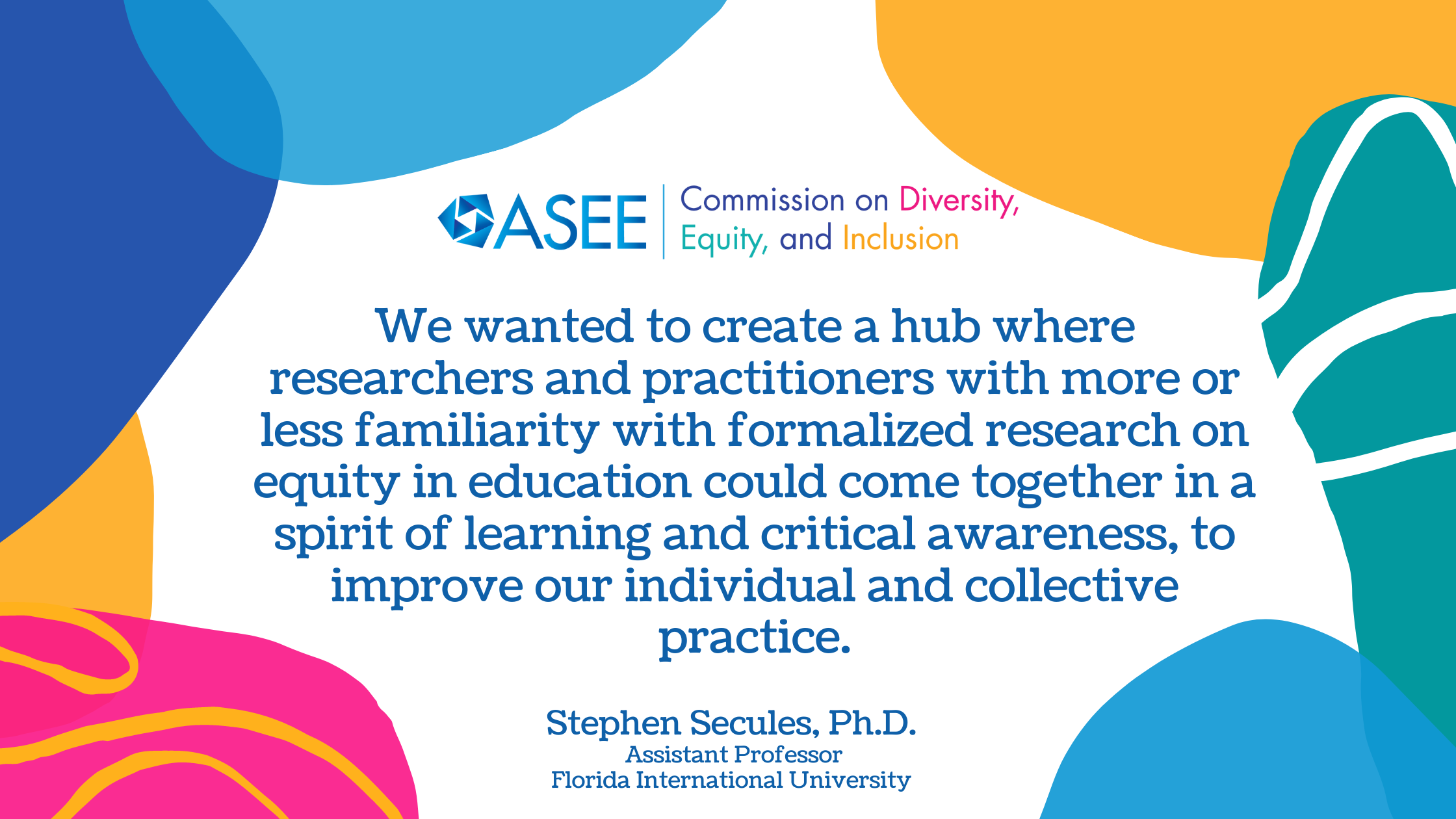Why We Made a Division on Equity, Culture, and Social Justice in Education
By Stephen Secules, Ph.D.
I’m writing in my capacity as Chair of the ASEE Equity, Culture, and Social Justice in Education (ECSJ) constituent committee (or in other words, provisional division). Two years ago, alongside James Holly, Jr. (Program Chair) and other early organizers (including Cassandra McCall, Alex Mejia, and Ethan Eagle) we developed a petition for a new division, recruited signatures in support, and submitted it to Headquarters for approval. We received constituent committee status in Spring 2020. We now have over 1000 members and have produced a fantastic program for the summer conference.
I will be stepping down as Chair at the Summer conference. James Holly, Jr. will take my place as Chair. We used our newly approved Bylaws to elect a full leadership slate for the 2022 year. I wanted to take this opportunity to write to ECSJ, CDEI, and ASEE members about the division and what I see for it going forward.
So where did the idea for the ECSJ division come from?
Initial (Spring 2019) conversations about the division purpose grew around the need to center topics such as culturally responsive pedagogy, critical analyses of dominant cultures, and opportunities for faculty to learn about equity. While we value the existence of these topics in other divisions such as Liberal Education / Engineering & Society (LE/ES), Minorities in Engineering Division (MIND), Faculty Development Division (FDD), and many others, we found that a coalition of individuals did not see a true home for their work. We also learned that at one point, CDEI itself was thought to function as a division with a technical paper program at the conference but would no longer have that function. We sought to create that home and fulfill the function for a new division focused on equity in education.
What does the division stand for?
The naming of the division was important to us. We wanted to emphasize equity in Education, as opposed to the underrepresentation of engineers in Engineering (which would be primarily in MIND) or the engagement of social justice in Engineering (which would be primarily in LE/ES). Among the initial organizers, we had a coalition of individuals for whom equity, culture, and/or social justice was the most important concept, so all of those words got combined in the title.
The membership and culture of the division was also important to us. We worried that some of our own writing about equity topics can become esoteric and exclusionary of the educational practitioners in the many technical engineering divisions. We wanted to create a hub where researchers and practitioners with more or less familiarity with formalized research on equity in education could come together in a spirit of learning and critical awareness, to improve our individual and collective practice. We felt that with over 30 technical divisions for the different sub-disciplines to reflect on technical aspects of education, there could be at least one additional division to focus on equity and inclusion aspects of their practice.
The inter-divisional approach was also important to us. In Spring 2020 upon receiving approval, we learned that our process of coalition-building across divisions had not been adequate, and some people involved in DEI work felt confused and excluded from the decision-making process to have a new division. We want to be intentional about being collaborative with parallel DEI divisions but not taking their territory, resources, or members. We also want to be intentional about collaboratively engaging with the technical divisions, rather than presuming we will be siloed away from them or take a heavy-handed approach to impact. This past year I have tried to envision what a role for interdivisional liaisons would look like for this new division. We have planned a panel of ASEE technical division representatives to speak about the particular equity issues in the sub-disciplines. Covid has upended some of our plans for community building this year, but it’s something I’d like to see us increase going forward.
In Summer 2020, the novel coronavirus, the deaths of so many Black people at the hands of police officers, and the protests that followed, all made the existence of a new equity division seem particularly timely. As you can tell from the longer approval timeline I’ve laid out here, this was largely a coincidence. It does feel all the more important to make new spaces for challenging oppressive systems and calling each other into critical awareness about them.
What is in store for the future of ECSJ?
First, I have been really proud of the cross-identity coalition we have been building in the ECSJ. As a White man who has been officially “in charge” of an equity division for two years, I think it’s time to pass the baton to James and others who will continue to define what it will mean to establish this division at the next level. I’m excited for what James and others will do. If you’d like to become more involved in a leadership role, please reach out to us as we start recruiting nominations for volunteers. I am looking forward to taking a backseat in this new intellectual community and home, and to offering any guidance as requested.
Second, I hope the division becomes a place for experimentation and new ways of working on equity within and outside of ASEE. The developers of our bylaws have tried to center equity and shared governance while working within the bounds of the ASEE system. I hope we continue to reimagine what a division means and push ourselves to innovation for impact on equity.
Finally, I hope the division continues to work with others to un-silo intellectual conversations on equity by collaborating with other DEI-focused and with non-DEI-focused divisions in ASEE. Expertise on equity should not be confined to conversations between people who have credentials on the subject and largely agree with one another. We are in a window of time when a broader public is becoming more aware of challenges that some of us continue to push on over the years. We should capitalize on this window (that will not last forever) to call our colleagues to a more intentional and informed focus on equity topics.
Although the challenges we face as a community that centers change towards diversity, equity, and inclusion are immense, I am optimistic about the future impact we will create together through our divisions, this professional organization, and beyond.
Thank you all and I’ll see you around,
Stephen Secules
Florida International University
Chair of ASEE Equity, Culture, and Social Justice Constituent Committee

Stephen Secules, Ph.D. Assistant Professor Florida International University
About the Author
Stephen Secules, Ph.D.
I am an Assistant Professor in Engineering Education at Florida International University. I have degrees in engineering and acoustics, and a PhD in education focused on culture and equity in engineering education. In my work, I use critical qualitative, video-based, participatory, and ethnographic methods to look at everyday educational settings in engineering and shift them towards equity and inclusion. I have ongoing projects related to critical analysis of dominant cultural norms in classroom spaces, and alternative dissemination approaches for qualitative research.
Connect with our guest blogger: LinkedIn, Twitter
Check out our previous blog posts:
- (June 2021) Teirra Holloman and Walter C. Lee, Ph.D., None of Our Hands Are Clean: A Letter to Engineers Committed to Racial Equity
- (May 2021) Katey Shirey, Ph.D, Two Strategies Towards Socially Just Engineering Integration in High School Science
- (March 2021) Jenn Stroud Rossmann, Ph.D., Remolding the World Together
- (February 2021) Tracie Addy, Ph.D., Let’s Not Underestimate the Power of Student Voice
- (December, 2020) Stephen Secules and Cassandra McCal, Taking A Deeper Look at Diversity Through Inclusion
Do you want to become a guest blogger?
CDEI Guest Blog highlight future events, describe best practices, or share calls to action by CDEI members. We invite you to propose posts that share brief research highlights, reports of impactful initiatives, critical thought pieces, and resources you find useful. We especially encourage emerging scholars to share their work. If you are interested in sharing a blog or resource post, you may submit your proposal here. All posts are screened and edited.


